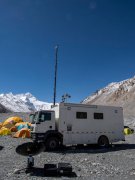Summit catapults world ahead in crucial year to curb warming
America's climate summit propelled the world forward on a path toward limiting the worst of global warming
April 24, 2021, 7:30 AM
6 min read
Share to FacebookShare to TwitterEmail this articlePresident Joe Biden speaks to the virtual Leaders Summit on Climate, from the East Room of the White House, Friday, April 23, 2021, in Washington. (AP Photo/Evan Vucci)
WASHINGTON -- The world moved closer to curbing the worst of global warming after this week's climate summit. But there’s still a long way to go, and the road to a safer future gets even rockier from here.
With the world trying to prevent more than another half-degree of warming (0.3 degrees Celsius) or so to achieve the most stringent of goals set by the 2015 Paris climate accord, scientists and politicians alike say this decade is crucial for any chance of getting that done. And that means 2021 is a “make-or-break year for people and the planet,” U.N. Secretary-General Antonio Guterres said.
Everything culminates in November with heavyweight climate negotiations in Glasgow, Scotland. While these climate meetings happen annually, every five or so years there is a weightier session of the type that in the past has led to major deals or disappointments. It's that time again.
By November, the U.N. climate negotiating process calls for 200 nations to ratchet up commitments to cut emissions of heat-trapping greenhouse gases by 2030. The rich countries need to come up with more money to help the poor countries develop greener power and adapt to climate change’s harsh realities. And nations need to agree on a price on carbon pollution after several years of gridlock. They must figure out essentially how to make it all work.
“Glasgow is the world’s last best hope,” said U.S. special climate envoy John Kerry.
There will be important stops in Germany in May for a minister’s level meeting, in a British seaside town in June for a meeting of leaders of big economies and a final push at U.N. headquarters in September, but everything is about what President Joe Biden called “a road that will take us to Glasgow.”
Biden’s summit, organized in less than 100 days, was designed to send the world off on a fast start toward Glasgow, and experts said it did so. They figure it pushed the globe anywhere from one-eighth to more than halfway along the journey, with mixed opinions on whether the United States did enough.
“If it were 100 miles to Glasgow, we have just done the first 12 miles on the lowlands, and we have a 88 hard miles to go, with a lot of difficult terrain to cross before we get there,” said Bill Hare, director of the German think tank Climate Analytics. Hare said while countries showed a significant increase in ambition to fight climate change, he was “hoping for slightly more.”
Climate scientist Zeke Hausfather, who directs climate issues at the Breakthrough Institute, was more optimistic: “I’d say this gets us about half the way (say, 50 miles) to where we need to get by Glasgow.”
Nate Hultman, director of the University of Maryland’s Center for Global Sustainability, was even more optimistic: “This has ended up being a critical international moment that provided a strong boost. ... We’re now, I’d say, about 70 miles toward Glasgow.”
For his part, Kerry concluded the climate summit by saying that countries representing more than half of the world’s economic output have committed to a path that would achieve the Paris goal of limiting warming to 1.5 degrees Celsius (2.7 degrees Fahrenheit) since pre-industrial times. Beyond that level, environmental problems get substantially worse, with possible dangerous tipping points, scientists say. The world has already warmed 1.2 degrees Celsius (2.2 degrees Fahrenheit).
Hare’s calculations show the world didn’t quite make as much progress as Kerry claims. For example, to be on the path to limit warming to 1.5 degrees, the United States needs to cut greenhouse gas emissions 57% below 2005 levels by 2030, he said. The Biden target announced this week was 50% to 52%. The European Union’s goals also came close but didn't quite get there. The only major economy now on track with 1.5 degrees is the United Kingdom, Hare said.










